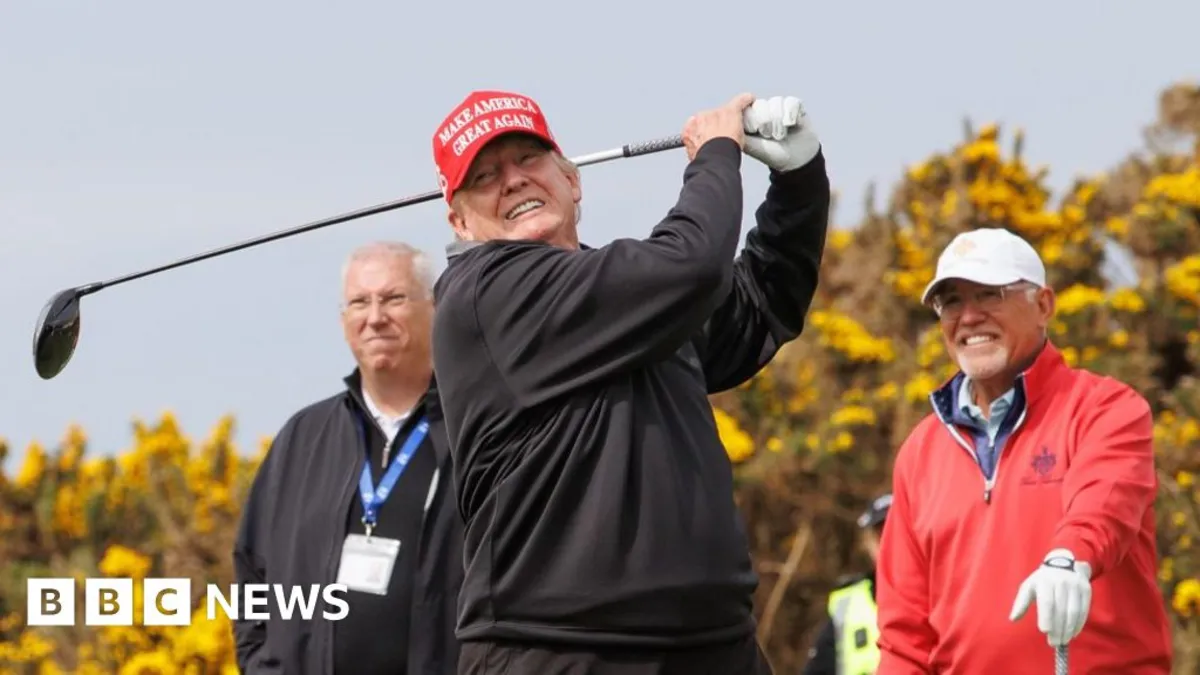
In an intriguing recount of golf and politics, Mick Mulvaney, former White House Chief of Staff, reflects on his experiences of playing golf with Donald Trump. During a match at Trump's Bedminster club in 2019, Mulvaney thought he had the upper hand, leading by one stroke with just three holes to go. "I slapped him on the shoulder and joked with him, 'I got you today, old man,'" Mulvaney recounted to the BBC. However, Trump swiftly turned the game around, birdieing two of the last three holes and defeating Mulvaney by two strokes. Throughout his three years in Trump's administration, Mulvaney played golf with the president around 40 times, yet he never managed to beat the man who is 21 years his senior, describing the experience as "soul-crushing."
Golf has long been a favored pastime for many American presidents, but none have shared the same deep connection with the sport as Trump. Currently in Scotland for the inauguration of a new golf course near Balmedie, Trump approaches golf not merely as a leisure activity, but as a business venture and a crucial networking opportunity. Unlike previous presidents like Barack Obama and George W. Bush, who used golf as a way to escape the pressures of their office, Trump's golf outings are intensely competitive. According to Mulvaney, Trump exhibits little patience for poor shots or slow play, implying that those who do not keep pace may not receive an invitation to play again.
British golf journalist Kevin Brown corroborated this sentiment from his own experience on the Balmedie course in 2012. He recalled taking in the scenery on the second hole, only to be told by other players that Trump had requested they speed up play. “He was more focused, head down, motoring on ahead of us,” Brown remarked.
Trump's passion for golf is evident; he has been playing since his college days and purchased his first golf property, Trump International Golf Club in West Palm Beach, Florida, in 1999. Today, Trump Golf manages 11 courses in the U.S. and three in the UK, with plans for new resorts in countries like Oman, Indonesia, Vietnam, and Qatar. While golf clubs are prized possessions for Trump, they are not always lucrative. For instance, Trump's Balmedie course reported losses of $1.83 million in 2023, marking its 11th consecutive year in the red, while the Turnberry course reported a profit of about $5 million.
Trump's desire to host prestigious tournaments at his courses, particularly the British Open at Turnberry, has led to clashes with local authorities, especially regarding land use and environmental concerns, such as wind turbines off the coast of Balmedie. Brown noted that Trump is attracted to high-profile golf properties for their prestige, which helps draw affluent clientele.
For many, a tee time with Trump is more than just a round of golf; it represents a unique opportunity to build connections in an exclusive environment that has historically been a domain of the elite. Golf has served as a strategic avenue for Trump, allowing him to engage with influential figures, including politicians and foreign leaders, despite his earlier promise in 2016 to minimize his golf play if elected to the White House.
During his presidency, Japanese Prime Minister Shinzo Abe presented Trump with a golden golf club, leading to five rounds of golf together and forging a friendship that lasted until Abe's tragic assassination in 2022. Trump’s golf partners have included political allies like Lindsey Graham and rivals such as Rand Paul, with whom he discussed both golf and tax policies during their rounds.
Trump's golfing connections have often translated into diplomatic conversations. For instance, earlier this year, he played golf with Finnish President Alexander Stubb, where discussions ranged from the ongoing war in Ukraine to global security. Stubb later remarked on the rarity of such extensive engagement between a Finnish president and a U.S. counterpart.
Professor David Cay Johnston, an expert on Trump, observes that interactions with the former president are highly transactional. Whether dealing with CEOs or world leaders, individuals often seek to either mitigate potential damage from Trump or gain insights into his thinking. This transactional nature is evident even in golf, as foreign leaders attempt to leverage golfing ties for favorable discussions.
Trump's penchant for privacy during golf outings provides a veil of secrecy, resulting in varying accounts of his golfing skills. He claims numerous club championships, yet critics like sports journalist Rick Reilly argue that these claims undermine his credibility, citing allegations of cheating, including taking multiple mulligans. Mulvaney, however, insists that while Trump may use golf as a way to connect, the essence of the game remains intact: “This is golf,” he said. “And while that sounds obtuse, golfers know what I mean.”
As Trump continues to engage with the game he loves, it becomes clear that golf is more than just a pastime for the former president; it is a critical tool for networking and influence, ensuring that even after his presidency, his connection to the sport will endure.